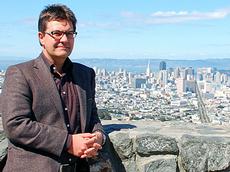The wonderful new world of Facebook
On sabbatical in the bustling city of San Francisco, the author is not just sampling the local culinary delights; he’s also seizing the opportunity to plunge into the world of Facebook and other social networks – and is finding it a unique experience.

I recently ate out at Tony’s Pizza Napoletana just around the corner from where I live in North Beach. The pizza at this place of uncompromising indulgence was, as ever, exquisite. Tony isn’t just any pizzaiolo, you see; he’s a multi-award-winning champion of his trade. In 2007 he became the first American (the first non-Neapolitan for that matter) to win the World Pizza Cup for the best pizza margherita in – you guessed it – Naples, the home of the famous dish.
Just as pizza from Naples took the world by storm, many an idea from the San Francisco Bay Area has also left its indelible mark on our globalized world: icons of the Internet era like Apple and Google were born here; and many of the new media (social media) recently sprouted from the fertile soils of Northern California or run their global dealings from the Bay Area: the microblogger service Twitter; the business network LinkedIn; or the shooting star of the social media, Facebook. Only recently, the US journal Fast Company elected Mark Zuckerberg’s Facebook number one among the top 50 most innovative companies in the world.
The “like” button
The start-up company based in Palo Alto just turned six and already claims to have over 400 million active users – a handsome number to say the least, but not enough for shrewd Zuckerberg: speaking at the developer conference in San Francisco a month ago, he announced that he was looking to link Facebook up to all the websites in the world; in his words, “a web where the default is social”. He is doing so by using cutting-edge web technology to increasingly integrate other social networks and websites into his own Facebook world.
The new “like button”, which Zuckerberg is looking to place at as many locations on the Web as possible, is emblematic of Facebook’s octopus-like approach; it shows me which of my Facebook “friends” likes the latest film showing at the cinema, Levis Action Jeans, or even the pizzeria next door. And if my friends like it, it can’t be all that bad, right? So I click the mouse and hey presto! My preferences are on Facebook too, where they in turn might encourage my friends’ friends to like what I like – an ever increasing circle. Mark my words: the button will be popping up all over the Web, and every time it does Facebook will be saying hi.
Friend of a friend
I set up my Facebook account three weeks ago to avoid losing contact with people back home altogether despite the 9000 kilometers and 9-hour time difference that separate us. I soon noticed that for a Facebook rookie old terms can take on whole new meanings. Take “friends”, for instance; Facebook informed me right at the outset that I should draw a distinction between content I wanted to be accessible to friends only, friends of friends, or the whole world; however, even though I went out of my way to restrict the settings to “only friends”, every day I’m still greeted by the friendly yet unfamiliar face of someone that Facebook has suggested I add to expand my circle of friends. All well and good; only I’m not really here to amass as many friends of my friends’ friends I don’t even know.
Diaspora: New York’s answer?
There’s a dizzying wealth of terms on Facebook; there are walls, messages, news feeds, pokes and requests. Ultimately, however – and this is the main reason for the growing unease – when you join the network you seem to be sacrificing the control over your own data. The young entrepreneurs from Palo Alto are gradually elbowing out the golden rule of nothing happening without my express permission. Everything is accessible to anyone. And if you want to change that, you have to click your way through a forest of pages, and even then you’re still not entirely sure if the opt-out will actually live up to its word.
The criticism the fathers of Facebook have been subject to on account of their handling of personal data is nothing new, but it has intensified in the wake of the latest announcements. A disgruntled group of skeptics openly calls for people to turn their backs on Facebook. Furthermore, four students from New York University are looking to set up an open-source alternative to Facebook that “hands back the control over his or her own data to the individual”. In order to fund their project, called “Diaspora”, the four Robin Hoods from New York have been collecting money so they can keep on programming through the summer. Their aim was to raise 10,000 dollars by June 1; so far they have received donation pledges for over 170,000 dollars in all, so money should no longer be an issue in developing the Facebook rival.
Fishing where the fish swim
Meanwhile, however, many companies and organizations – including universities – have their pages on Facebook. Large media companies cannot escape the lure of Facebook either, as a glimpse at the Showcase List reveals. It would appear that Facebook’s sheer number of users and staggering growth rates are persuading many companies that they simply can’t afford not to be on Facebook. After all, you have to cast your net where the fish are.
I still use Facebook; however, it remains to be seen whether my flirtation with the king of social networks will blossom into something more permanent. After all, social networks have so many advantages – even if it’s just to express your enthusiasm after a great concert and share it with other aficionados, or to look up where you can find a decent pizza in your neighborhood on the local reference portal yelp (which incidentally also comes from San Francisco); no prizes for guessing which pizzeria it recommended to me.
About the author
Roman Klingler studied political science at the University of Lausanne and was a journalist (print and TV) for over twelve years before he joined ETH Zurich’s Corporate Communications department. He has been running the Media Relations team since 2006 and is currently on sabbatical at swissnex in San Francisco – a network of outposts that promote the exchange of ideas in science, technology and culture in Asia and the USA. The network is run by the Swiss State Secretariat for Education and Research and has offices in Bangalore, Boston, San Francisco, Singapore and Shanghai.
- 08.06.10: Globetrotter: If there was a like button...
- 28.05.10: Globetrotter: I like it!










READER COMMENTS